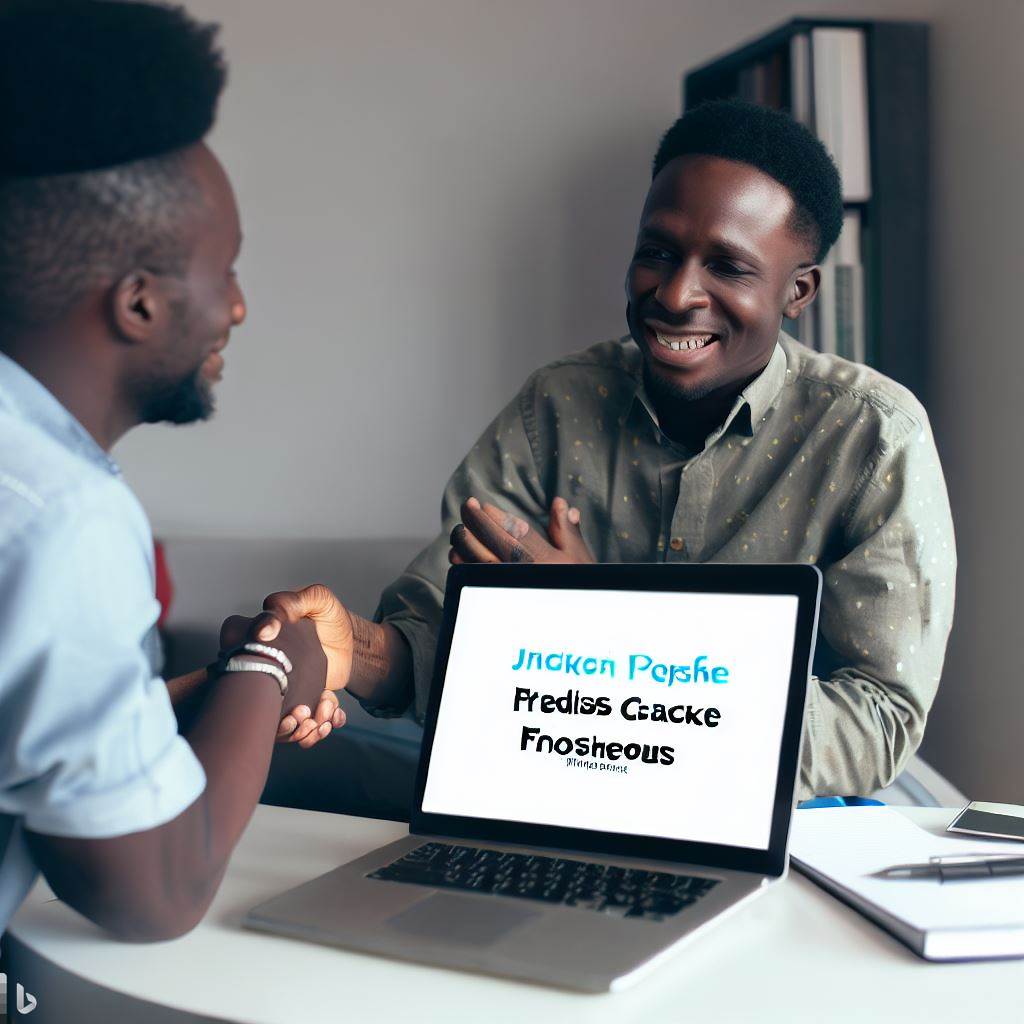Introduction
Nigeria’s gig economy represents a flourishing market of freelancers offering diverse skills on-demand. Ranging from tech wizards to creative artists, it’s a vibrant network of innovation.
Central to this dynamic system are proposals. These are succinct, convincing pitches highlighting a freelancer’s capabilities, solutions and pricing.
Their importance cannot be overstated. Proposals are the lifeblood of securing contracts and building successful freelance careers. They create first impressions, establish credibility, and communicate value propositions.
This post aims to empower Nigerian gig workers by exploring the power of effective proposals. We’ll unravel how well-crafted proposals can leverage opportunities in the gig economy.
We will dive deep into the techniques that make a proposal stand out and secure more contracts.
So, if you’re a gig worker looking to amplify your success, this is your guide. Embrace the journey of leveraging the power of proposals in Nigeria’s gig economy.
Understanding Proposals
Proposals are an essential part of the gig economy in Nigeria. Whether you’re a freelance writer bidding for a new project or a graphic designer pitching a proposal to a potential client, understanding proposals is critical to success.
Definition of Proposals
A proposal is a written document that outlines a plan or suggestion for a particular project or task.
The primary purpose of proposals is to persuade someone to do something or to convince them that your ideas are worth implementing.
Proposals can be both solicited and unsolicited. Solicited proposals are requests for proposals (RFPs) sent out by companies or organizations seeking proposals for specific projects.
Unsolicited proposals, on the other hand, are proposals sent to potential clients without prior request.
Types of Proposals
In the gig economy, there are various types of proposals. Some of the most common proposals include:
- Bid proposals: These are proposals submitted as part of a bidding process, usually in response to a request for proposal (RFP).
- Scope of work proposals: These proposals outline the specific work that will be done and by whom.
- Project proposals: These proposals outline the stages of a project, timelines, and anticipated outcomes.
- Business proposals: These proposals are used to secure funding, partnerships or form strategic alliances.
Importance of Proposals in the Gig Economy
Proposals are the backbone of the gig economy in Nigeria. They are a powerful tool for freelancers, entrepreneurs, and business owners to showcase their skills, experience, and expertise. Proposals help individuals win contracts, secure partnerships, and close deals.
Proposals are also crucial to building a strong reputation and establishing credibility in the gig economy.
By submitting a well-written proposal, you demonstrate your knowledge and competence in your field, which can attract new clients and increase your earning potential.
Transform Your Freelance Journey
Unlock your potential with expert Freelance Consulting. Receive a personalized PDF in 1-3 business days, with revisions until you're satisfied.
Get StartedMoreover, proposals offer an opportunity to differentiate yourself from your competitors.
When submitting a proposal, you can highlight your unique selling points and show how your skills or services can benefit the client. This can give you a competitive edge and increase your chances of winning contracts or proposals.
Essentially, proposals are a vital component of the gig economy in Nigeria. Whether you’re a freelancer, entrepreneur or business owner, understanding proposals is essential to your success.
By definition, proposals are written documents outlining a plan or suggestion for a particular project or task.
There are various types of proposals, including bid proposals, scope of work proposals, project proposals, and business proposals.
Proposals are important because they are a powerful tool for securing contracts, building a strong reputation, and establishing credibility in the gig economy.
Read: Nigeria Freelance: Turn Prospects into Clients with Pitching
Creating Winning Proposals
Researching the Client
The first step to creating a winning proposal is to research the client. This involves gathering information about the client’s business, goals, and needs.
This research will help you understand the client’s perspective and tailor your proposal to meet their specific needs.
Understanding the Project Requirements
Once you have researched the client, it is important to understand the project requirements. This involves analyzing the project scope, timeline, budget, and deliverables.
Understanding these requirements will help you create a proposal that is both feasible and meets the client’s expectations.
Creating a Proposal Structure
When creating a proposal structure, it is important to follow a consistent format that includes an introduction, problem statement, proposed solution, timeline, budget, and deliverables.
This structure will help you organize your proposal in a logical, easy-to-read manner.
Tips for writing a winning proposal
- Use clear, concise language that is easy to understand.
- Focus on the benefits to the client, rather than just the features of the solution.
- Provide evidence of previous successful projects or client testimonials.
- Create a sense of urgency by highlighting the potential risks of not taking action.
- Include a clear call to action and next steps.
Examples of Successful Proposals
Here are a few examples of successful proposals:
Transform Your Freelance Profile into a Client Magnet
Unlock unparalleled opportunities with a profile that stands out. We craft compelling summaries and optimize your skills to attract high-paying clients no one else can reach.
Optimize Now- The proposal that helped a startup win a contract with a major retailer. The proposal focused on the client’s specific pain points and highlighted the startup’s unique approach to solving them.
- The proposal that helped a freelancer win a long-term client. The proposal demonstrated the freelancer’s expertise and highlighted their ability to work within the client’s specific budget and timeline.
- The proposal that helped a consulting firm win a large-scale project. The proposal used data and analytics to support the proposed solution and provided a detailed breakdown of the timeline and budget.
By following these tips and creating a well-structured proposal that meets the client’s specific needs, you can increase your chances of success in Nigeria’s gig economy.
Remember to focus on the client’s perspective and provide clear evidence of your expertise and experience.
Read: Mastering Proposals as a Freelancer in Nigeria’s Market

Sending and Following Up on Proposals
Sending Proposals to Clients
In Nigeria’s gig economy, sending proposals to clients is a crucial step in securing contracts.Proposals help to showcase your abilities, skills, and experience to potential clients.
It is imperative to include all necessary details in your proposals, such as the project scope, timeline, budget, and any additional requirements.
To enhance your proposals, you can also include case studies, testimonials, awards received, and relevant qualifications to increase your credibility in the eyes of your clients.
Ensure your proposals are concise, clear, and well-structured to captivate clients and boost your chances of securing contracts.
Importance of Following Up
Following up after sending out proposals is the critical next step in securing contracts. Clients receive hundreds of proposals, and you must stand out from the crowd.
Hence, following up shows your commitment to the project and demonstrates your dedication towards getting the contract. Failure to follow up can also provide a wrong impression to your potential clients, which could potentially ruin future prospects.
Moreover, following up provides an excellent opportunity to address any concerns the client may have and clarify any ambiguity in the proposal.
It also shows your clients that you are proactive and respond promptly to their enquiries, creating a trustworthy relationship.
In summary, following up is pivotal to securing contracts and building long-term client relationships within the gig economy in Nigeria.
Best Practices for Following Up
- Timing: Following up too soon or too late may be counterproductive; it’s essential to gauge the right time to follow up. Ideally, you should follow up within 2-3 working days after sending the proposal.
- Personalize the follow-up: Personalizing the follow-up shows that you’re genuinely interested in the project. Addressing the client by name, referencing specific details from the proposal, and identifying their pain points displays your diligence and expertise.
- Keep it short and straightforward: Your clients are busy individuals, and you wouldn’t want to waste their time with long messages. Therefore, ensure your follow-up is succinct and straight to the point.
- Provide additional value: Providing additional value, such as proposing an initial meeting or suggesting innovative ideas to improve the project, can increase the likelihood of securing the contract. Clients appreciate individuals who go the extra mile, and this can set you apart from other competitors.
- Use email tracking software: Email tracking software provides insights on whether the client has opened, clicked, and replied to the email. It creates an opportunity to personalize follow-up messages and gauge the client’s level of interest.
In fact, proposals serve as a significant tool in securing contracts within Nigeria’s gig economy.
Following up is essential to increase your chances of securing the contract and building long-term client relationships.
Reveal Your Untapped Niche for Maximum Earnings
Imagine excelling in a niche where your skills shine and competition fades. We analyze markets and your talents to pinpoint the most profitable niches uniquely tailored to you—opportunities others overlook.
Find NicheIncorporating best practices when sending and following up on proposals can elevate your business in the gig economy.
Read: Nailing the Perfect Pitch: A Guide for Nigerian Freelancers
Negotiating and Closing Deals
Understanding Negotiation
- Negotiation is a process of reaching a compromise or agreement between two parties.
- It involves understanding each other’s needs, wants, and interests to find common ground.
- Negotiation allows both parties to come to an agreement that is mutually beneficial.
Tips for Successful Negotiation
- Do your research and know what you want out of the negotiation.
- Understand the other party and their needs.
- Listen actively and show empathy towards the other party.
- Remain calm, composed, and professional during the negotiation.
- Be willing to compromise and find a solution that works for both parties.
- Keep the end goal in mind and stay focused on the main issues at hand.
Closing Deals With Clients
Closing a deal involves finalizing the details of the agreement and getting the client to commit. To successfully close a deal, use the following tips:
- Recap the terms of the agreement to ensure mutual understanding.
- Address any last-minute concerns or objections from the client.
- Offer an incentive, such as a discount or additional service, to sweeten the deal.
- Create a sense of urgency, emphasizing the benefits of closing the deal quickly.
- Use clear and concise language when finalizing the terms of the agreement.
- Follow up with the client promptly to ensure satisfaction and future business opportunities.
Negotiating and closing deals is a crucial part of succeeding in Nigeria’s gig economy.
By understanding the negotiation process and using effective strategies, you can find success in building lasting client relationships and growing your business.
Read: Creating a Freelance Portfolio in Nigeria that Lands Clients
Conclusion
Recap of the Importance of Proposals in Nigeria’s Gig Economy
Proposals are essential for freelancers and gig economy workers in Nigeria to secure clients and increase their earnings.
Final Thoughts on Leveraging the Power of Proposals
To effectively leverage the power of proposals, one must put in the effort to create a tailored proposal that addresses the client’s needs and showcases their skills and experience.
Call to Action for Readers
As a freelancer or gig economy worker in Nigeria, take the time to invest in creating high-quality proposals that stand out to potential clients.
By doing so, you can increase your chances of getting hired and ultimately, boost your earnings.




